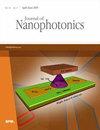Optical spin injection and detection in submonolayer InAs/GaAs nanostructures by circularly polarized photoluminescence
IF 1.1
4区 物理与天体物理
Q4 NANOSCIENCE & NANOTECHNOLOGY
引用次数: 0
Abstract
Stacked submonolayer (SML) InAs/GaAs nanostructures, assembled by cyclic, alternating deposition of SML (<1 ML) InAs and few-monolayer GaAs using molecular beam epitaxy, have been attracting interest, owing to their unique optical and electronic properties. Recently, it has been demonstrated that a growth transition during SML deposition can lead to two types of nanostructures: 2D islands and 3D structures. The properties of SML nanostructures also make them strong candidates for spintronic and quantum information applications. However, the spin properties of SML nanostructures have not yet been investigated. In this study, the spin properties of SML nanostructures are investigated using optical spin injection and detection experiments by circularly polarized photoluminescence (CP-PL). Spins are injected into the SML nanostructures using the optical selection rules in GaAs for CP excitation, whereas the spin state in the SML nanostructures is detected by measuring the right (σ+) and left (σ−) CP intensity components of the PL. The degree of CP-PL is estimated by quantity P=[I(σ+)−I(σ−)]/[I(σ+)+I(σ−)], where I(σ±) is the luminescence intensity for the σ± component. The quantity P is a direct measure of the spin state in the SML nanostructures. Using a sample containing both 2D and 3D SML nanostructures, experimental results yield a relatively high P=6% for the 3D SML nanostructures and a relatively low P=2% for the 2D SML nanostructures. The difference may be attributed to the higher carrier confinement for 3D SML resulting in preservation of the spin state. Analytical calculations considering the spin and carrier lifetimes are also carried out to model the experimental results. These results provide insight into the fundamental spin dynamics of 2D and 3D SML nanostructures and pave the way for spintronics and quantum information applications of SML nanostructures.通过圆偏振光致发光实现亚单层 InAs/GaAs 纳米结构中的光自旋注入和检测
堆叠亚单层(SML)InAs/GaAs 纳米结构是利用分子束外延技术循环交替沉积 SML(小于 1 ML)InAs 和少单层 GaAs 而形成的,由于其独特的光学和电子特性而备受关注。最近的研究表明,SML 沉积过程中的生长转变可产生两种类型的纳米结构:二维岛状结构和三维结构。SML 纳米结构的特性也使其成为自旋电子和量子信息应用的有力候选材料。然而,SML 纳米结构的自旋特性尚未得到研究。本研究利用光学自旋注入和圆偏振光致发光(CP-PL)检测实验研究了 SML 纳米结构的自旋特性。利用砷化镓中用于 CP 激发的光学选择规则将自旋注入 SML 纳米结构,并通过测量 PL 的右侧(σ+)和左侧(σ-)CP 强度分量来检测 SML 纳米结构中的自旋状态。CP-PL 的程度通过 P=[I(σ+)-I(σ-)]/[I(σ+)+I(σ-)]来估算,其中 I(σ±) 是 σ± 分量的发光强度。P 量是 SML 纳米结构中自旋状态的直接测量值。使用包含二维和三维 SML 纳米结构的样品,实验结果表明三维 SML 纳米结构的 P=6% 相对较高,而二维 SML 纳米结构的 P=2% 相对较低。造成这种差异的原因可能是三维 SML 的载流子束缚更高,从而保留了自旋态。为了模拟实验结果,还对自旋和载流子寿命进行了分析计算。这些结果提供了对二维和三维 SML 纳米结构基本自旋动力学的深入了解,为 SML 纳米结构的自旋电子学和量子信息应用铺平了道路。
本文章由计算机程序翻译,如有差异,请以英文原文为准。
求助全文
约1分钟内获得全文
求助全文
来源期刊

Journal of Nanophotonics
工程技术-光学
CiteScore
2.60
自引率
6.70%
发文量
42
审稿时长
3 months
期刊介绍:
The Journal of Nanophotonics publishes peer-reviewed papers focusing on the fabrication and application of nanostructures that facilitate the generation, propagation, manipulation, and detection of light from the infrared to the ultraviolet regimes.
 求助内容:
求助内容: 应助结果提醒方式:
应助结果提醒方式:


